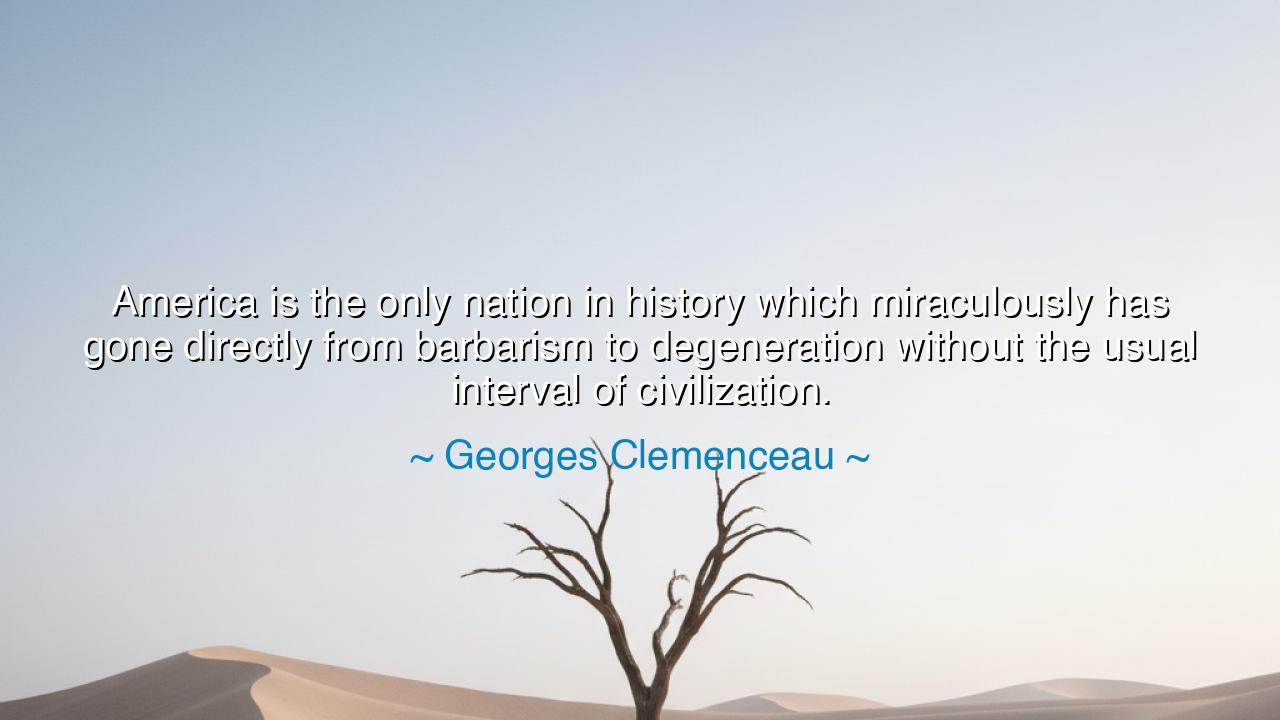
America is the only nation in history which miraculously has gone
America is the only nation in history which miraculously has gone directly from barbarism to degeneration without the usual interval of civilization.






“America is the only nation in history which miraculously has gone directly from barbarism to degeneration without the usual interval of civilization.” – Georges Clemenceau
Thus spoke Georges Clemenceau, the fierce French statesman known as The Tiger, whose sharp tongue cut as deeply as his intellect. His words, though searing, were not born from hatred but from a philosopher’s lament. In this biting observation, he exposes what he perceived as the paradox of America — a nation of immense power and promise, yet one that, in his eyes, had skipped the noble middle path of civilization that tempers strength with wisdom, progress with virtue. Clemenceau’s statement, half satire and half sorrow, warns of a truth as old as empire: that material triumph without moral depth leads not to greatness, but to degeneration.
The origin of these words lies in the early twentieth century, when Clemenceau, having witnessed both the rise of American wealth and the fall of European nobility, viewed history with a weary and discerning eye. Europe had endured centuries of slow evolution—through monarchy, philosophy, and revolution—each era shaping its civilization’s soul through suffering and reflection. But America, new and bold, seemed to leap over that long process. In its rapid ascent from frontier to industrial power, Clemenceau saw something both miraculous and troubling: a people who had conquered the wilderness, harnessed invention, and mastered wealth—yet without pausing to cultivate the inner virtues that form the heart of civilization: humility, restraint, and reverence for wisdom.
To understand his meaning, we must recall that civilization in the ancient sense was not merely the presence of art or comfort, but the refinement of the human spirit. The Greeks, through philosophy and tragedy, learned the balance between freedom and fate. The Romans, through law and discipline, built order upon chaos. Even France, through revolution and reason, sought to reconcile power with principle. Yet Clemenceau believed that America, in her youth and speed, mistook prosperity for progress and innovation for virtue. He saw a nation rushing to wealth and industry without cultivating the moral and intellectual traditions that once gave older civilizations their strength. Thus, in his jest, America went directly from barbarism to degeneration, skipping the noble apprenticeship of culture and reflection.
Consider the story of the Gilded Age, that glittering century in which America’s cities rose like steel giants, her factories roared with invention, and her railways stitched the continent together. Outwardly, it was an age of progress, but beneath the gold lay greed and inequality. Men like Carnegie and Rockefeller built fortunes vast enough to rival kings, while the laborers who laid their foundations toiled in poverty. It was an age where ambition outpaced ethics, and industry eclipsed humanity. In this, Clemenceau’s words found their proof: barbarism, reborn in modern form—not of savagery with swords, but of exploitation with machines. It was power without proportion, progress without compassion — the degeneration of civilization’s true ideals.
Yet Clemenceau’s words, though harsh, were not prophecy of doom but a warning — a challenge to awaken the moral conscience of modern power. He did not despise America; rather, he feared for her. For every nation that rises without balance risks the fate of Rome, whose empire expanded while its virtue decayed. Clemenceau’s observation reminds all peoples that civilization is not inherited, but built anew in each generation through character, education, and justice. Without these, even the greatest wealth becomes vanity, and the brightest nations burn out like stars that consume themselves in their own brilliance.
Still, we must not hear his words only as condemnation, but as a call to self-awareness. For the heart of civilization lies in the courage to look inward — to question our motives, to confront our own barbarism, and to strive for the higher path. America, and indeed all nations, are capable of transformation. The same spirit that conquered the frontier can also conquer ignorance and greed; the same energy that built empires can be turned to build virtue. Clemenceau’s words, though centuries old, echo into every age where speed outruns wisdom, and power forgets its purpose.
So, my child of the future, take this teaching into your heart: do not mistake advancement for enlightenment. A true civilization is not measured by its towers or its technology, but by its compassion, its justice, and its depth of thought. Beware the temptation to move fast and forget to grow wise. For as Georges Clemenceau reminds us, when a people rush toward greatness without reflection, they risk falling not forward, but backward—from barbarism to degeneration. But when they pause to cultivate wisdom, to balance power with virtue, then civilization itself is reborn—and the miracle is no longer a warning, but a triumph of the human spirit.






AAdministratorAdministrator
Welcome, honored guests. Please leave a comment, we will respond soon